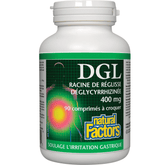8 Tips for Good Digestion
There is a quote that says "you are what you eat". This is true in the context of our eating habits, the way we prepare food so as not to destroy its nutritional value and the way we ingest it so as to facilitate digestionthat is to say, with the least amount of stress possible.1
Today, with digestive problems multiplying to name only the gastric reflux and all the pharmacopoeia which accentuates this problem, it is clear that digestion is disturbed as well as the assimilation of food. "We are what we assimilate"..1, 4, 5
From digestion to absorption: digestive enzymes
Did you know that digestive enzymes are produced intrinsically and are specific catalysts. They activate reactions according to their role. They break down the food we eat into small molecules to make it assimilable.5, 6
Digestive enzymes: the digestive mechanisms
Enzymatic activity starts while we are cooking our food or at the first signal of hunger. When we chew our food, saliva activates ptyalin (amylase), an enzyme that promotes the digestion of starch, which begins in the mouth and begins the long journey through the digestive system. Several organs and systems are solicited to achieve the result of the assimilation.
Once the food is well chewed, it goes down the esophagus to the stomach by a nervous reflex that causes the secretion of digestive juices. The main function of the stomach is to initiate the digestion of proteins by hydrochloric acid and proteolytic enzymes (pepsin), which will break down the food bolus into smaller molecules pushed by peristaltic movements towards the intestine. This stage lasts from 1 to 4 hours and takes place in a very acidic environment.
Slowly but surely, the stomach delivers this mush called chyme to the intestine. The pancreas then releases enzymes while the liver produces bile. The flow of pancreatic and hepatic juices transforms the acidic chyme of the stomach into the alkaline chyle of the small intestine, where the nutrients pass through the microvilli via the blood and lymph to carry this nutrition to its destination.
Complete digestion takes 3 to 10 hours.2, 4
From digestion to absorption: the stomach
The action of hydrochloric acid (Betaine HCL) in the stomach
- Hydrochloric acid in the stomach is our first immune barrier, so it is essential to protect this integrity against pathogens (bacteria).
- It facilitates the flow of bile and pancreatic enzymes.
- Changing the pH or reducing this acid exposes the development of the bacteria, Helicobacter pylori.
- Hydrochloric acid is essential for the absorption of proteins and minerals such as calcium, iron, etc.
- Zinc is a cofactor in the production of hydrochloric acid.
- Stress is the enemy of digestion.6
Signs of a lack of hydrochloric acid
- Bloating, belching, heartburn, flatulence immediately after meals
- Poor digestion, diarrhea, constipation
Heartburn
I often hear people with heartburn believe that it is caused by high stomach acid production and reflux in the esophageal tube.
Explanation: Acidity rises in the esophagus when there is insufficient hydrochloric acid production, because the small valve called the "cardia" at the entrance to the stomach closes properly when there is an abundance of hydrochloric acid in the stomach. If this is not the case, the cardia remains open, which causes the acid to rise into the oesophagus, resulting in gastric reflux..1, 2, 3, 4, 5, 6
Causes that slow down or inhibit our digestive secretions
- Junk food: eating cooked and/or reheated food
- chronic stress
- poor chewing
- certain medications
- aging
The consequences are poor digestion and absorption, gas and bloating, intestinal irregularity, food intolerances or allergies, inflammation, leaky gut, etc..1, 2, 4, 5, 6
From digestion to absorption: the intestine
The intestine fulfills three important functions: it completes the digestion of the food that the stomach has prepared, it allows the digested food to be absorbed by the body, and it eliminates unabsorbable or unabsorbed matter through defecation.
Pain in the intestine
In the last ten years, we have witnessed a trend of bowel disorders, which were not common before this period. They were occurring without any systematic identification of symptoms. The symptoms that were common were constipation, diarrhea and stomach aches. Irritated or even inflamed bowel was rarely mentioned. No link had been established between stress on the gut and feeding to target intruders.
The processing of wheat in the grain industry has seen an increase in gluten (%) to facilitate bread making; an everyday food that suddenly sounded the alarm. By removing it from the diet, we immediately saw the impact on the health of the intestine.1, 4, 5
Did you know that the gluten in bread is the protein part of the wheat. This elastic material is responsible for the rise of the bread to give it its beautiful round shape.
Gluten and other intolerances
Gluten erases the microvilli in our small intestine (or bacterial flora), the area that plays a crucial role in the absorption of nutrients from our food. Once this area is affected by inflammation, our pain receptors become activated. As long as the intruder is part of the diet, the scenario remains the same, i.e., the gut remains in crisis.
In addition, it has been found that there are other intruders in certain foods that are frequently eaten on a daily basis. The foods that cause the most intolerance are wheat, therefore gluten, dairy products, corn, soy, oats, etc.
By removing these sabotaging foods from the diet, the intestine is already getting better..1, 3, 4, 5, 7
Among the terms used to identify people who suffer from intestinal pain are: irritable bowel syndrome, Crohn's disease, leaky gut syndrome, celiac disease.
Let's recap
Digesting wellTo digest well is to have a digestive system capable of transforming ingested food into nutritive materials that are qualitatively and quantitatively suitable for absorption and assimilation.
To absorb wellis to have a gastric and especially intestinal mucosa capable of ensuring the passage of nutrients into the blood and lymph in a form suitable for assimilation.
To assimilate wellis to have an organism capable of reaching its destination with all the nutrients "in good and due form"..1, 2, 3, 4, 5
8 tips for a good digestion
Since one out of three people in Canada suffers from digestive problems, Natural Factors has formulated supplements to improve digestive quality, enhance the absorption process, increase vital energy, promote intestinal regularity, reduce the symptoms of food intolerances, regulate inflammation, etc..5
8 tips for good digestion: MacroGest
MacroGest Keto-Paleo or Vegetarian are enzymatic preparations specific to the diet.
The Keto-Paleo complex complex will help to break down foods rich in proteins and lipids such as dairy products, butter, eggs and meat.
- Helps digestion and reduce flatulence caused by high-calorie or high-fat meals.
- Helps maintain natural internal intestinal balance and regularity.
- Improves digestion, nutrient absorption and colon health.1, 4, 5
MacroGest Vegetarian is a plant-based enzyme preparation designed to support the breakdown of foods such as beans, whole grains, fruits and vegetables in order to reduce flatulence and bloating. It is a perfect formula for vegetarians, vegans or raw food eaters who have a high fiber diet..5
*Stress and fatigue are important factors that prevent proper digestion. The use of digestive enzymes during a more demanding period can facilitate digestion.1, 3, 4, 5
8 tips for good digestion: Gluten Relief
Gluten Relief is a special blend of enzymes perfectly balanced to allow the complete assimilation of hard-to-digest foods, especially cereal grains and dairy products that contain carbohydrates, proteins, gluten and casein.
Gluten Relief relieves symptoms such as gas and bloating that are associated with eating high-fiber foods.1, 4, 5, 7
8 tips for good digestion: Ginger Chew
Chewable ginger is a remedy traditionally used for digestive discomfort such as lack of appetite, nausea, indigestion and gas. The Ginger Chew Natural Factors Ginger Chew helps relieve nausea or vomiting after surgery or associated with motion sickness or during pregnancy, or menstrual cramps, while contributing to digestive health.
Each chewable tablet contains 20 mg of ginger and is deliciously sweetened with xylitol and stevia.5
8 tips for good digestion:DGL or deglycyrrhizinated licorice root
DGL or deglycyrrhizinated licorice root aids digestion and treats gastric discomfort, including heartburn, indigestion and inhibits the presence of H. pylori bacteria. In addition, DGL calms and protects the stomach lining (mucin), helping to heal ulcers and prevent them from recurring. It can be used as a mouthwash as it helps to heal mouth ulcers.
*DGL extract does not contain glycyrrhizin, so it is absolutely safe, even for people with high blood pressure.
*The infection of the H. pylori bacteria must be done by a medical analysis.5, 6
8 tips for a good digestion: Gastro-Assist
Gastro-Assist provides complete gastrointestinal support. It helps relieve occasional discomfort related to poor digestion, such as diarrhea, constipation, bloating, gas and heartburn. This unique recipe is made with mastic gum, probiotics, L-carnosine zinc and chamomile which helps protect the stomach and intestine while contributing to a healthy gut microflora and immune system.
Gastro-Assist protects and heals the stomach lining and intestinal mucosa.5, 6
8 tips for good digestion: Peppermint oil
Peppermint oil promotes good digestion, naturally. This blend of peppermint, oregano and caraway oil has effective anti-fungal properties. The capsules are gastro-resistant which allows the delivery of the oils to the intestines where they can best soothe the symptoms of irritable bowel syndrome (IBS) and digestive disorders.5
8 tips for good digestion: RelieFibre
RelieFibre Organic IBS Low FODMAP is a source of fiber to maintain good gastrointestinal function. It helps improve bowel regularity, including constipation and/or diarrhea.
- FODMAP: These are the foods allowed and those to avoid for irritable bowel syndrome.5, 7
8 Tips for Good Digestion: Zymactive Double Strength
Zymactive double concentration is a systemic enzyme preparation that has more than four times the concentration of other proteolytic enzyme supplements. This unique combination of proteolytic enzymes breaks down the proteins that cause inflammation and pain caused by sports injuries, for example.
This product is beneficial for cases of sinusitis, asthma or bronchitis. To use this product and eliminate inflammation, it is important to take this product on an empty stomach..5
To target the health problem, it is good to consult a naturopath.
As it is the end that crowns the work, the digestive health is the answer to a good assimilation.
About the author
Marie Couture, Certified Naturopath
Specialized in:
- Digestive disorders
- Inflammation
- Hormonal problems
- Stress management
References :
- Joyeux Pr. Henri and Joyeux Jean, eating better and better from 0 to 100 yearsEditions de Rocher, 2017, 326 pages
- Marieb Élaine N. Human anatomy and physiology 2ndÉditions ERPI, 1999, 1194 pages
- Vasey Christopher, Manual of detoxificationÉditions Jouvence, 1992, 185 pages
- Watson Brenda, Renew your lifeRenew Life, Press and information Services, 2002, 188 pages











2 comments
Bonjour Christiane,
Pour plus de renseignements et recommandations, vous pouvez discuter avec nos conseillers en santé et naturopathes en appelant aux horaires d’ouverture de nos magasins au 819-771-3000 extension 221.
J’ai lu avec bcp d’attention votre excellent article et vous en remercie.
En cas d’oeusophagite, que me conseilleriez-vous?